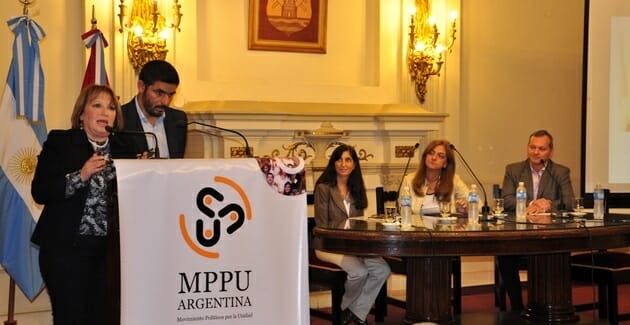
Apr 7, 2015 | Focolare Worldwide
 “Chiara Lubich has brought understanding and gentleness, but basically what she has given to us, through her simplicity, is a great current of love towards the other person. To live in community, to know how to share, to work for the common good and to succeed in building fraternity also through diverse political viewpoints, this in summary is her message.” So stated Alicia Monic Pregno, Vice-Governor for the Province of Cordoba (Argentina), in the context of this international acknowledgement of the inheritance transmitted through the thought and life of Chiara Lubich. During its session on 25 March 2015, the House of Representatives in the Province, approved the posthumous decree in recognition of the Work of Focolare Movement founder.
“Chiara Lubich has brought understanding and gentleness, but basically what she has given to us, through her simplicity, is a great current of love towards the other person. To live in community, to know how to share, to work for the common good and to succeed in building fraternity also through diverse political viewpoints, this in summary is her message.” So stated Alicia Monic Pregno, Vice-Governor for the Province of Cordoba (Argentina), in the context of this international acknowledgement of the inheritance transmitted through the thought and life of Chiara Lubich. During its session on 25 March 2015, the House of Representatives in the Province, approved the posthumous decree in recognition of the Work of Focolare Movement founder.
The ceremony was held in the same parliamentary hall in the presence of a huge crowd which included members of parliament of different political parties, representatives of Comipaz (Interreligious Committee for Peace), young political students of the Movement of Politics & Policies for Unity, university professors, members of social organisation, and others.
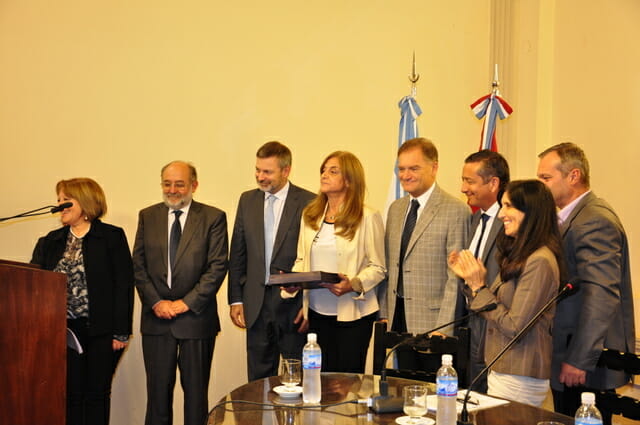 The delegates of the Focolare Movement in Cordoba presented the figure of Chiara Lubich and immediately afterwards the Vice-Governor invited politicians from different political parties to carry out the symbolic gesture of consigning to them, all together, the decree and the commemorative plaque.
The delegates of the Focolare Movement in Cordoba presented the figure of Chiara Lubich and immediately afterwards the Vice-Governor invited politicians from different political parties to carry out the symbolic gesture of consigning to them, all together, the decree and the commemorative plaque.
Alicia Monica Pregno then went on to explain the motivations for the award: the contribution towards the building up of a community which promotes the “spirituality of unity”, adding that “Lubich’s message raises many questions which lead us to reflect on the reason behind all the conflicts, on why we are not always able to think things out together.” She said, “I believe that the world is called to journey towards a better destiny, and this is achievable in the measure that we lay aside our personal interests and are open to resolve issues through a shared outlook. This is a great challenge in these times characterised by much individualism.”
Pastor Raffa, representing Comipaz, then spoke. He emphasised the contribution of the charism of Chiara Lubich to the “birth of this commission right from the beginning”; and Soher El Sucaría, political activist, shared how through an experience lived within the Interreligious Committee for Peace, the value of this service became more and more evident.
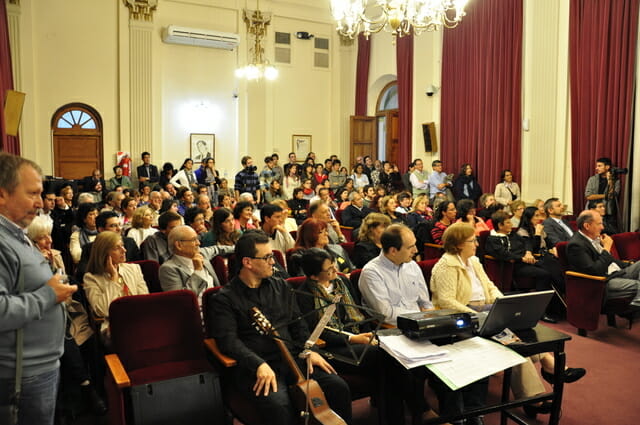 Several testimonies by individual citizens then followed. They told stories of personal transformation and their commitment to local politics: from joining forces with neighbours in order to resolve the problems of their neighbourhoods, to assuming political commitment on a regional and national level. This part of the program was conducted through two round tables. The first, entitled “Fraternity, Seed of Social Transformation”, included the participation of Estela Daima (Director of a Caritas Department in Rio III which conducts a break-making activity involving 40 women), Paola Chávez, Secretary of Fazenda de la Esperanza association (who presented the testimony of Agustina, a reformed juvenile criminal), and Ricardo Galli, economist and entrepreneur of an Economy of Communion project.
Several testimonies by individual citizens then followed. They told stories of personal transformation and their commitment to local politics: from joining forces with neighbours in order to resolve the problems of their neighbourhoods, to assuming political commitment on a regional and national level. This part of the program was conducted through two round tables. The first, entitled “Fraternity, Seed of Social Transformation”, included the participation of Estela Daima (Director of a Caritas Department in Rio III which conducts a break-making activity involving 40 women), Paola Chávez, Secretary of Fazenda de la Esperanza association (who presented the testimony of Agustina, a reformed juvenile criminal), and Ricardo Galli, economist and entrepreneur of an Economy of Communion project.
In the round table entitled “The Contribution of Fraternity to Politics: Experiences and Challenges”, Laura Blanco, a socialist, presented the Schools of Politics organised in Parliament House, as well as her commitment to live fraternity in the political arena. Other speakers included Julio Bañuelos, Mayor of Mina Clavero, and Guillermo Castillo, member of the Christian Democratic Party and public administrator.
In all those present there was the certainty that when fraternity is lived as a political goal, it provides answers to the challenges of today which call for a society that is more just and all-embracing.
In conclusion, the Vice-Governor expressed her appreciation that the Parliament of Cordoba is the centre for the Schools of Politics for young people and underlined the efforts which are being made in living the concept of fraternity within Parliament itself.

Apr 6, 2015 | Non categorizzato
 Like the Prodigal Son
Like the Prodigal Son
“Our eldest 17 year-old son didn’t come back home one night. What were we to think? He had never caused us worry before. All we could do was pray. The next morning, through the parents of two of his friends, we found out that the three of them had gone to Florence. Somebody wanted to call the police, another insisted he would have nothing more to do with his son. My wife and I, instead, tried to remain calm; we had put everything in God’s hands. Every so often, we would receive some news of them.
While it was a big suffering, we felt very united as a family. There was one thing we all agreed on: we would have welcomed him back with joy, just like in the parable of the prodigal son, without laying on the guilt for his childish behaviour. A week later, the three of them came back home. Our son, having felt our love, was truly sorry for what he had done and assured us he would never do anything like that again. When he found out that his mates had been treated somewhat differently, he was all the more grateful for having a family where everyone tries to live the Gospel.” F.A. – Rome
A Shared Suffering
“The father and sister of my daughter’s friend died in an accident. I had lost my father in similar circumstances. Even though I only knew her mother by sight, when I heard what had happened, I felt compelled to visit her. But I didn’t want it to be just a simple visit. Knowing that she was in financial difficulties, I took her various food items and I tried to console her. I visited her quite often. I even gave her some money I had set aside for us. As time went by, she felt much stronger, more reassured and grateful for the friendship which had blossomed among us, thanks to the suffering that we shared.” B.G. – Bolivia
The beanie
“It was winter time and my friends and I were playing in the school yard. It was very cold. At one stage, a little girl started crying. Her woollen hat didn’t quite cover her ears and they were so cold they hurt her. I wanted to love Jesus in her so I gave her my own beanie which kept her warm.” J. – Belgium
Morning tea
“I was having a snack in the playground. I saw a friend of mine pull another girl’s hair. I left my snack on the wall and I went up to her to say not to do that because Jesus said that we had to love all the time. But then, since both of them started crying, I went to get my snack and I shared it with both of them. It’s true that I was quite hungry, but I was happy because I was able to love.” Valentina – Italia.
Source: “The Daily Gospel” April 2015, Città Nuova publishing house
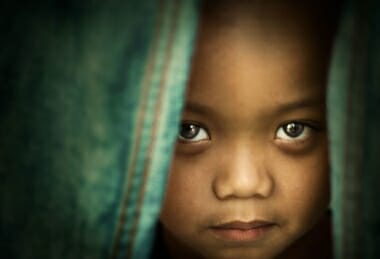
Apr 4, 2015 | Non categorizzato

“I wish that we could all have Easter eyes
Capable of looking
into death, until we see life
into the hurts, until we see forgiveness,
into separation, until we see unity,
into the wounds, until we see glory,
into the human person, until we see God,
into God, until we see the human person,
into Myself until I see You.
And in addition to this, to see the power of Easter!”
(Easter 1993)
Klaus Hemmerle, “La luce dentro le cose”, Città Nuova, Rome 1998, p. 110.

Apr 3, 2015 | Focolare Worldwide
 “Oh, there’s a light with nails on it!
“Oh, there’s a light with nails on it!
So exclaims a child in front of the Paschal candle.
We can feel the nails.
But can we see the Light?
And what about us … do we give out light?
We are nailed
to ourselves and to others;
to our time and our responsibilities.
The Holy One has allowed himself to be nailed to our cross.
And it was from there that he come down.
He was nailed right up until he died.
In this way he became light for everyone;
that light which penetrates closed doors.
He is risen
and shows the signs of the nails.
Light which was nailed.
We feel the nails.
But can we see the Light? And what about us … do we give light?
(From a pastoral letter on the occasion of Easter 1984)
Klaus Hemmerle, “La luce dentro le cose”, Città Nuova, Rome 1998, p. 109.
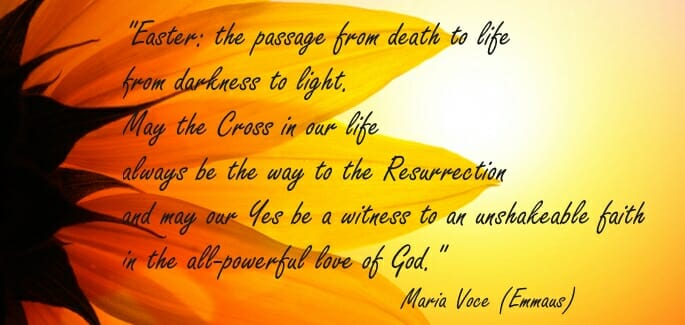
Apr 2, 2015 | Non categorizzato


Apr 1, 2015 | Non categorizzato
 “In the Easter Liturgy we thank God for having made Christ shine in all His splendour after He saved humankind through the Paschal Mystery. He fills the Church with the Holy Spirit and admirably enriches it with heavenly gifts. Among these is the royal priesthood, which is conferred on the faithful in baptism. Hence, the Church is holy, filled with the Holy Spirit. It is the Body of Christ who is total holiness. Christ instituted the Church to continue the Redemption with her. He made her the means of liberation from evil and of the attraction to what is good. She is the Gospel fulfilled, humankind recuperated, life with God in perennial unity, uninterrupted sharing of grace: this is the Church.
“In the Easter Liturgy we thank God for having made Christ shine in all His splendour after He saved humankind through the Paschal Mystery. He fills the Church with the Holy Spirit and admirably enriches it with heavenly gifts. Among these is the royal priesthood, which is conferred on the faithful in baptism. Hence, the Church is holy, filled with the Holy Spirit. It is the Body of Christ who is total holiness. Christ instituted the Church to continue the Redemption with her. He made her the means of liberation from evil and of the attraction to what is good. She is the Gospel fulfilled, humankind recuperated, life with God in perennial unity, uninterrupted sharing of grace: this is the Church.
And we are the Church, joined together by the Sacraments and the Doctrine with the pope and bishops. We form a social body whose arteries carry the Blood of Christ whose soul is the Holy Spirit, the Source of holiness. So the Church is the worthy dwelling of the Divine Trinity on earth. Manzoni calls her: ‘Mother of the saints, an image of the Eternal City’. Our sanctification is her task. The Paschal Mystery summarises the reason for our existence on this planet and the reason for which the very Son of God came down to earth and was crucified.”
Giordani goes on to underscore humankind’s longing for holiness and truth, which rejects a dull existence without warmth, but desires to thrive. This is why we go wrong when we offer a languid, uncertain Christianity, deceiving ourselves into thinking that this is how we will draw people in.
“This ‘saying without saying’ generates a desert region, a no man’s land. It is of no service to the Lord whose word was always quite explicit. It doesn’t serve God and provokes the disgust of the very ones who think they are rendering the idea of religion more appetising.
Those who have attenuated the truth, who have camouflaged the Cross and used it as a wall decoration have extracted from the people the beauty, truth and power of the Divine command that invites us to give body, soul and all that we are to God. We are meant to stand on the side of Christ to the point of becoming Him. The Gospel teaches us to say yes when we mean yes, and no when we mean no. This ‘neither this nor that’ approach defaces the truth and nullifies the Church. Sanctify them in the truth; your word is truth! This is what Jesus asked of the Father as he was about to consummate his supreme sacrifice of love. Sanctify them in the truth, not in neutrality, mediocrity, or banality.
If you totally embrace Christ, then anything you do during the day professes the faith. Then life becomes a marvellous undertaking, an uninterrupted liturgy where, rich or poor, ailing or sound, man or woman, young or old – everyone has something to do for the edification of all, edifying an eternal destiny with the material elements of a temporal existence. This is sanctification. It is by no means a desertion from life. It is living life, completely – a healthy life.
Christ asks everyone – even you and me – to follow Him by breaking with the past, with everything that is dead, and to rediscover the joy of our youth. This is freedom.
Then, the Church, through which the Saviour continues to bestow health, appears as a Divine minister of health: a sacrament that alleviates death with resurrection.”
Igino Giordani, Il mistero pasquale, (Rome; Città Nuova, March 25, 1977), pp.24-25.
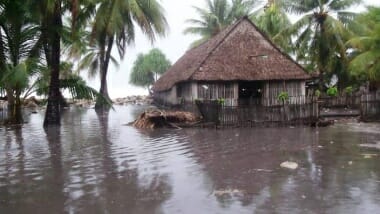
Mar 31, 2015 | Non categorizzato
 The main causeway connecting the capital and the port with the rest of the Island of Tarawa, the largest in the archipelago of Kiribati, situated in Oceania, has been destroyed. Seawalls have broken down and many of the traditional houses close to the water are gone. Cyclone Pam, one of the most violent cyclones registered in the South Pacific region, hit the island nations of Vanuatu, Solomon Islands and Kiribati. Massive waves were whipped up by winds of 250/300 km per hour. The local Red Cross says there is a lack of emergency housing, food and drinking water for most of the 253,000 inhabitants and people living in the most affected areas are being evacuated.
The main causeway connecting the capital and the port with the rest of the Island of Tarawa, the largest in the archipelago of Kiribati, situated in Oceania, has been destroyed. Seawalls have broken down and many of the traditional houses close to the water are gone. Cyclone Pam, one of the most violent cyclones registered in the South Pacific region, hit the island nations of Vanuatu, Solomon Islands and Kiribati. Massive waves were whipped up by winds of 250/300 km per hour. The local Red Cross says there is a lack of emergency housing, food and drinking water for most of the 253,000 inhabitants and people living in the most affected areas are being evacuated.
Mary Cass, coordinator of the AMU project, writes from Perth, Australia: “We have received emails from our Focolare community there. The people are safe and joining in the work to re-build and find food and water for the families of Buota (the village where the project is administered), which is also cut off at this time due to inaccessibility, since the road and bridge connecting them to the rest of Tarawa are down. They have very much in mind the Word of Life for this month which encourages everyone to ‘take up their cross’, and hope to meet together to share experiences and to reinforce their unity during this difficult time.”
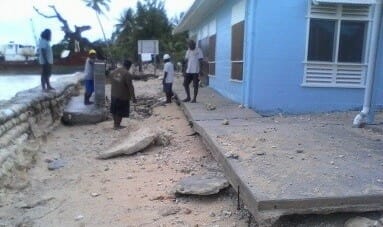 “The weather is getting back to normal,” a member of the local community writes. “The waves are smiling again. We are thankful that everyone is okay.”
“The weather is getting back to normal,” a member of the local community writes. “The waves are smiling again. We are thankful that everyone is okay.”
But while the spirit and the dignity of the inhabitants of Tarawa is admirable, the situation is indeed very serious: contamination of drinking water wells and tank; shortage of food due to the destruction of crops and the hindrance of travel; shortage of diesel fuel; 80% destruction of local native housing…
Furthermore, the Republic of Kiribati has another huge problem. The increased sea levels have had an impact on agriculture with negative effects on nourishment and employment. Only 10% of the population has regular work. Cited as the first country that will disappear as a result of global warming and increased sea levels, the Kiribati Government have been preparing for mass evacuation of the islands to other countries within a few decades.
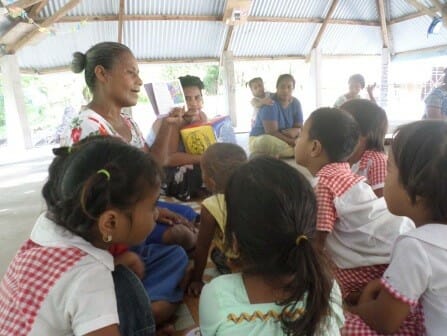 The project administered by AMU (an NGO of the Focolare Movement) aims to improve the education and living standards of the local people of Buota, considered one of the poorest villages on the main Island of Tarawa, through initiatives particularly for woman and children. There is also assistance for the development of craft activities and small business ventures.
The project administered by AMU (an NGO of the Focolare Movement) aims to improve the education and living standards of the local people of Buota, considered one of the poorest villages on the main Island of Tarawa, through initiatives particularly for woman and children. There is also assistance for the development of craft activities and small business ventures.
“One such activity,” continues Mary Cass, “is the production of ice blocks due to the acquisition of a freezer; another is sewing and craft-making where handicrafts are sold at the Tarawa airport twice weekly. The purchase of a sewing machine through AMU funding has made this possible. The bread making activity is also doing well with bread and buns being sold in roadside shops in surrounding areas.
The proceeds from these activities, other than giving work to the women involved, go to the pre-school called ‘Love and Unity’ and provides basic food and nourishment for children and their families.”
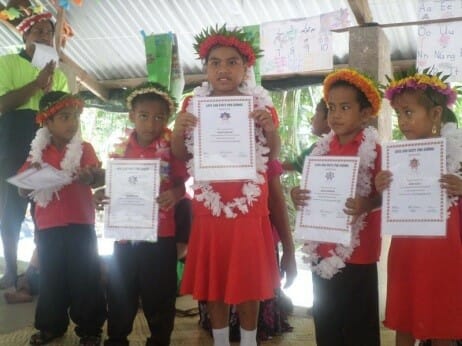 How does one live in a nation which has no future? “The life of the local Focolare community in Buota is forging ahead. “The Word of Life groups,” they write, “unite the people spread across the whole stretch of land. The Bishop of Tarawa, through the help of priests, translates the commentary on the Word of Life in the local Gilbertese language. The families help each other to re-build their homes destroyed by natural calamities and they come together to share their experiences once they manage to put a roof over their heads. The community has named their formation centre (which encompasses a little school) Loppiano Centre of Unity and Love – in reference to the first little town of the Focolare in Italy – with the desire to be a witness of love and unity for everyone.”
How does one live in a nation which has no future? “The life of the local Focolare community in Buota is forging ahead. “The Word of Life groups,” they write, “unite the people spread across the whole stretch of land. The Bishop of Tarawa, through the help of priests, translates the commentary on the Word of Life in the local Gilbertese language. The families help each other to re-build their homes destroyed by natural calamities and they come together to share their experiences once they manage to put a roof over their heads. The community has named their formation centre (which encompasses a little school) Loppiano Centre of Unity and Love – in reference to the first little town of the Focolare in Italy – with the desire to be a witness of love and unity for everyone.”
See also:
AMU Project Description (Italian)
AMU Newsletter n. 1/2015 (Italian)
Video on Facebook
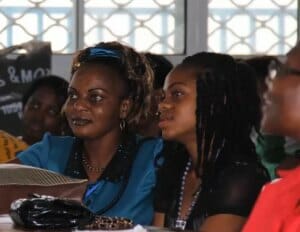
Mar 30, 2015 | Focolare Worldwide
 “Everyone would like to see the Economy of Communion project expand in Africa, out of love for Africa, in order to understand its cultures and practice reciprocity and communion,” said Luigino Bruni, international coordinator of the EoC project, as he looked ahead to the upcoming international gathering in May. That gathering will take place in Kenya, Nairobi, with international representatives from the EoC who will share ideas, innovations and production, but also work, microcredit, inequality and poverty. The African businesses which, from this year, have begun to share their profits with the poor of the world have grown to ten businesses, while twelve businesses are heading in that direction. This is all thanks to a growing spreading of a culture of economy of communion in Africa.
“Everyone would like to see the Economy of Communion project expand in Africa, out of love for Africa, in order to understand its cultures and practice reciprocity and communion,” said Luigino Bruni, international coordinator of the EoC project, as he looked ahead to the upcoming international gathering in May. That gathering will take place in Kenya, Nairobi, with international representatives from the EoC who will share ideas, innovations and production, but also work, microcredit, inequality and poverty. The African businesses which, from this year, have begun to share their profits with the poor of the world have grown to ten businesses, while twelve businesses are heading in that direction. This is all thanks to a growing spreading of a culture of economy of communion in Africa.
This was demonstrated with the recent international conference (February 9-13), which was hosted by Cameroon University, the Catholic University of Buea (CUIB) at the request of the university’s Rector, Fr.. George Kkeze, and by the Bishop, Emmanuel Bushu.
Speakers included Benedetto Gui, currently a professor at Sophia University Institute (Florence, Italy) and Brice Kemguem, National Director for Central Africa in the international ngo named AHA (African Humanitarian Agency). They were accompanied by Steve William Azeumo, from the EoC Commission of the Central African area, Winnifred Nwafor, from the EoC Commission of Fontem, Cameroon, Isabel Awungnjia Atem and Mabih Nji, both graduates of the Sophia University Institute in the role of local facilitators at CUIB.
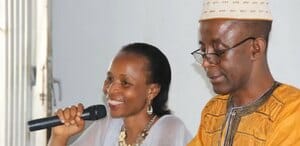 The topics included in the programme have ranged from contemporary economic issues that are dear to the Social Doctrine of the Church and that we find in the values and principles of the EoC, to the great economic and social problems of our time and the shortage of drinking water, epidemics and armed conflicts with weapons of mass destruction.
The topics included in the programme have ranged from contemporary economic issues that are dear to the Social Doctrine of the Church and that we find in the values and principles of the EoC, to the great economic and social problems of our time and the shortage of drinking water, epidemics and armed conflicts with weapons of mass destruction.
Thanks to the video conference connection, it was possible to get to know experiences from around the world. A connection made with the Sophia University Institute facilitated an exchange between the students of the two institutions. After that, two EoC entrepreneurs shared their experiences: Alberto Ferrucci, managing director of a company that produces software for refineries emphasized various aspects of an economy of sharing, a new proposal to solve the economic problems of our age. Teresa Ganzon (manager of the Philippine Rural Bank Bangko Kabayan) reminded participants of the principles of good corporate management that led her to resume her studies in adulthood in order to acquire the necessary knowledge and skills to manage the bank, helping the increase of activity of rural microfinance (micro-credit to farmers and small traders) in the area.
Some Cameroonian experiences were also shared, such as that of chief Fobella Morfaw and his wife, who founded a school in the town of Dschang in 2003 which today consists of a kindergarten, primary and secondary schools; or that of the Civil Engineering Studio at BSE (Bridge Structure Engineering Consulting) that thanks to the great experience of a ‘senior’ partner has now got to the point of getting by and managing well in the midst of a very fierce competition. The studio benefited from the financial and moral support of the Gimou couple; in the days immediately preceding the school Mrs. Marie Madeleine Gimou left this earth and this has deeply moved the participants of the conference. Her husband M. Victor Gimou who has been an engineer for over 23 years continues to support the young studio and to offer access to his library collected throughout his more than 30 years of work.
A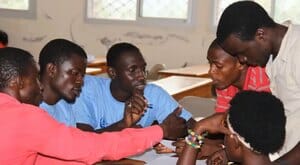 n important part of the program was composed of the workshops in the afternoon, aimed to discuss cases of companies and to prepare projects of micro-enterprises: these had a high attendance and caused amazement because of the quality of the papers presented in the plenary sessions; the best EoC business plan was awarded in the concluding session.
n important part of the program was composed of the workshops in the afternoon, aimed to discuss cases of companies and to prepare projects of micro-enterprises: these had a high attendance and caused amazement because of the quality of the papers presented in the plenary sessions; the best EoC business plan was awarded in the concluding session.
If we want to make a small balance: we were treated to a very fruitful week, thanks to the preparatory work done by the University and the very positive attitude of the young people who volunteered to participate, also encouraged by a recognition of university credits in exchange. There was a very sympathetic register and a cheerful atmosphere throughout the conference: the intervals were often filled with fun activities, a little dance or music. The evening of celebration was simply breathtaking, with songs and dances organized by the young people, with that “little extra atmosphere” that was created by the light of the phones, because there was a sudden blackout.
Participants had very positive impressions: many of them admitted that, in addition to proposing a style of enterprise management, the EoC is also a “proposal of life” that you can put into practice immediately, and many declared they wanted to follow it. In short: a lot of positive vibes and desire to do and work for a better world.
Edc online
Video of the Conference:
https://www.youtube.com/watch?v=RxwKXsEvmn0
![Word of Life April 2015]()
Mar 29, 2015 | Non categorizzato, Word of
 Audio of the Word of Life
Audio of the Word of Life
Paul offers us a superb way of being truly love for one another, by ‘making ourselves one’ with them.
In his first letter to the community in Corinth, from which the Word of Life for this month comes, Paul has to defend himself against the scant regard some Christians show for him. They called into question or denied that he was an apostle. After demonstrating fully his qualifications as an apostle because he had ‘seen Jesus Christ’ (see 9:1), Paul explained why he acted with humility and deference to the point of even giving up any payment for his work. While he could have asserted his authority and his rights as an apostle, he preferred to make himself ‘the servant of all’. This is his evangelical strategy.
He enters into solidarity with every kind of person, to the point of becoming one of them, with the aim of bringing the freshness of the Gospel. Five times he repeats ‘I made myself’ one with the other: with Jews, out of love for them, he puts himself under the Mosaic Law even though he said he was not bound by it; with non-Jews, who did not follow the Law of Moses, he lived as someone not under the Mosaic Law, because he had instead a more demanding law, Jesus himself; with those who came to be called the ‘weak’ (probably scrupulous Christians), who worried about whether they should eat the flesh of animals sacrificed to idols, he too became weak even though he was ‘strong’ and experienced a tremendous liberty. In a word, he made himself ‘all things to all people.’
Every time he repeats that he acts like this to ‘win’ each for Christ, to ‘save’ by any means at least someone. He has no illusions, is without triumphalist expectations, knows well that only a number will respond to his love. All the same he loves everyone and puts himself at the service of all according to the example of the Lord, who ‘came not to be served but to serve, and to give his life as a ransom for many’ (Mt 20:28). Who has made himself one with us more than Jesus? He who was God ‘emptied himself, taking the form of a slave, being born in human likeness’ (Phil 2:7).
‘I have become all things to all people.’
Chiara Lubich made this word one of the key points of her ‘art of loving’, summed up in the expression ‘to make yourself one.’ She saw in it an expression of the ‘diplomacy’ of charity. She wrote, ‘When someone weeps, we must weep too. And if someone laughs, we too rejoice . Thus the cross is divided and borne by many shoulders, and joy is multiplied and shared by many hearts…. Making ourselves one with our neighbour for love of Jesus, with the love of Jesus, so that our neighbour, sweetly wounded by the love of God in us, will want to make himself or herself one with us, in a mutual exchange of help, of ideals, of projects, of affections…. This is the diplomacy of charity, which has many of the expressions and features of ordinary diplomacy; hence it does not say all that it could say, for this would displease others and would be disagreeable to God. It knows how to wait, how to speak, how to reach its goal. It is the divine diplomacy of the Word who becomes flesh to make us divine.’
With the skill of a teacher, Chiara also discerns the daily difficulties we have in ‘making ourselves one’: ‘At times we are distracted, at times we have the unfortunate desire to be hasty in saying what we think, in giving our advice at the wrong moment. On other occasions, we are not really open to making ourselves one with our neighbour because we reckon that they do not understand our love, or we are held back by other kinds of judgements. In some cases we are hampered by a hidden wish to conquer the other person to our cause.’ For this reason ‘it is really necessary to cut with or set aside all that fills our minds and our hearts so that we can make ourselves one with others.’ It is thus a love that is constant and tireless, which carries on through thick and thin and is not on the look-out for anything for itself, and that in turn entrusts itself to the greater and stronger love of God.
These are useful ideas that can help us to live the Word of Life this month, by listening sincerely to the other person, understanding the other from within, identifying with what he or she is living and feeling, sharing his or her worries and joys:
‘I have become all things to all people.’
We cannot interpret this invitation of the Gospel as a request to renounce our convictions, as if we approved uncritically of any kind of behaviour in other people and did not have our own life-choices and our own way of thinking. If we have loved to the point of becoming the other, and if what we have shared has been a gift of love and has created a sincere relationship, we can and we must express our own ideas, even though perhaps they may cause pain, all the while remaining in an attitude of profound love. Making ourselves one is not a sign of weakness, nor of looking for a calm and easy way of living together. Instead, it is the expression of a person who is free who chooses to be at the service of others; it demands courage and determination.
It is important to bear in mind the purpose of making ourselves one.
Paul’s words that we are living this month, as we have already hinted, go on to say ‘by any means save some.’ Paul justifies his making himself one with the desire to bring people salvation. It is a way of entering into the other, to draw out the good and the truth within them, to put an end to any errors there may be and set down a seed of the Gospel. It is a task that for the apostle admits of no limits or excuses, that cannot be ducked because it has been entrusted to him by God himself, and he must do it ‘by all means’, with that creativity which only love can bring.
This is the intention that, in the end, motivates our ‘making ourselves one’. Politics and commerce also wish to come close to people, to enter into their way of thinking, to understand their longings and needs, but they always want some kind of return. Instead, Chiara would say, ‘Divine diplomacy has this greatness and this property, perhaps a property of it alone: it is moved by the good of the other and is therefore devoid of any shadow of selfishness.’
‘Making ourselves one’ therefore, to help everyone grow in love and so contribute to making people universally brothers and sisters, God’s dream for humanity, the reason that Jesus gave his life.
Fabio Ciardi
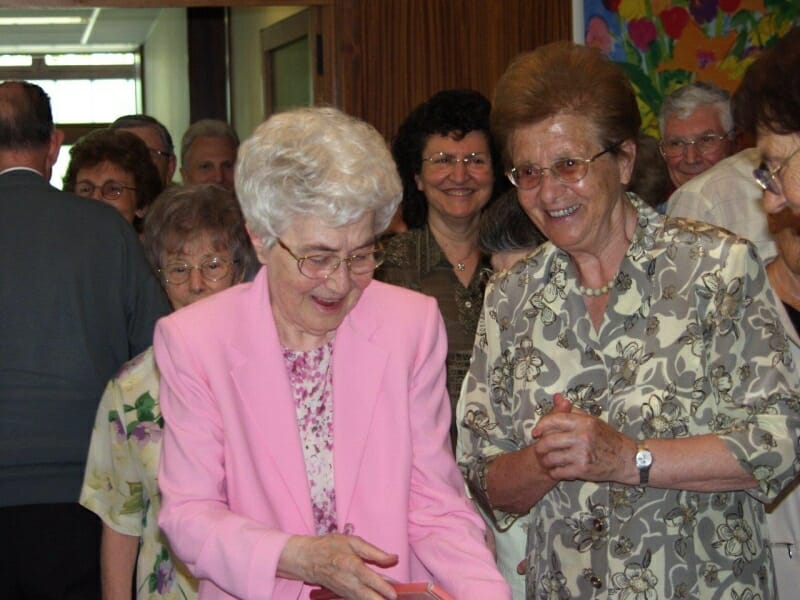
Mar 28, 2015 | Non categorizzato

Palmira with Chiara Lubich

 “Chiara Lubich has brought understanding and gentleness, but basically what she has given to us, through her simplicity, is a great current of love towards the other person. To live in community, to know how to share, to work for the common good and to succeed in building fraternity also through diverse political viewpoints, this in summary is her message.” So stated Alicia Monic Pregno, Vice-Governor for the Province of Cordoba (Argentina), in the context of this international acknowledgement of the inheritance transmitted through the thought and life of Chiara Lubich. During its session on 25 March 2015, the House of Representatives in the Province, approved the posthumous decree in recognition of the Work of Focolare Movement founder.
“Chiara Lubich has brought understanding and gentleness, but basically what she has given to us, through her simplicity, is a great current of love towards the other person. To live in community, to know how to share, to work for the common good and to succeed in building fraternity also through diverse political viewpoints, this in summary is her message.” So stated Alicia Monic Pregno, Vice-Governor for the Province of Cordoba (Argentina), in the context of this international acknowledgement of the inheritance transmitted through the thought and life of Chiara Lubich. During its session on 25 March 2015, the House of Representatives in the Province, approved the posthumous decree in recognition of the Work of Focolare Movement founder. The delegates of the Focolare Movement in Cordoba presented the figure of Chiara Lubich and immediately afterwards the Vice-Governor invited politicians from different political parties to carry out the symbolic gesture of consigning to them, all together, the decree and the commemorative plaque.
The delegates of the Focolare Movement in Cordoba presented the figure of Chiara Lubich and immediately afterwards the Vice-Governor invited politicians from different political parties to carry out the symbolic gesture of consigning to them, all together, the decree and the commemorative plaque. Several testimonies by individual citizens then followed. They told stories of personal transformation and their commitment to local politics: from joining forces with neighbours in order to resolve the problems of their neighbourhoods, to assuming political commitment on a regional and national level. This part of the program was conducted through two round tables. The first, entitled “Fraternity, Seed of Social Transformation”, included the participation of Estela Daima (Director of a Caritas Department in Rio III which conducts a break-making activity involving 40 women), Paola Chávez, Secretary of Fazenda de la Esperanza association (who presented the testimony of Agustina, a reformed juvenile criminal), and Ricardo Galli, economist and entrepreneur of an Economy of Communion project.
Several testimonies by individual citizens then followed. They told stories of personal transformation and their commitment to local politics: from joining forces with neighbours in order to resolve the problems of their neighbourhoods, to assuming political commitment on a regional and national level. This part of the program was conducted through two round tables. The first, entitled “Fraternity, Seed of Social Transformation”, included the participation of Estela Daima (Director of a Caritas Department in Rio III which conducts a break-making activity involving 40 women), Paola Chávez, Secretary of Fazenda de la Esperanza association (who presented the testimony of Agustina, a reformed juvenile criminal), and Ricardo Galli, economist and entrepreneur of an Economy of Communion project.












